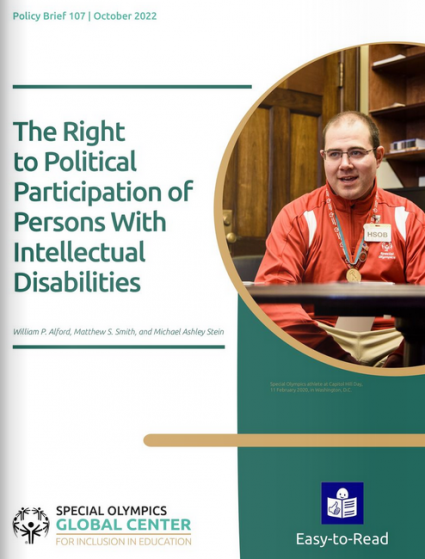Resources
Politics and Persons with Intellectual Disabilities
Challenges and Good Practices from Around the World in Easy Read Format

Special Olympics International's easy read guide on the right to political participation aims to inform persons with intellectual disabilities about their right to be involved in politics and what they can do to advocate for that right.
This guide contains information in easy read format for persons with intellectual disabilities about their right to political participation and what self-advocates around the world are doing to protect this important human right. It is an easy read summary of a longer policy brief about this important right.
Information for Persons with Intellectual Disabilities
Special Olympics International recently published an easy read guide about the right of persons with intellectual disabilities to political participation.
- This guide has a lot of information about some of the problems that persons with intellectual disabilities face.
- This guide also has information about what self-advocates are doing to overcome these barriers.
- This guide might give you some good ideas for how to advocate for this important right in your community.
What Political Participation Means
Political participation means "being involved in politics."
- Being involved in politics means taking part in how your government works or the choices it makes.
- Being involved in politics gives you a chance to make your voice heard and shape how choices get made.
- Being involved in politics can mean voting, helping others to vote, being in political organizations, talking to candidates about important things, running for office, and much more.
An Important Advocacy Tool
An important tool to advocate for the right to political participation is called the Convention on the Rights of Persons with Disabilities, or "CRPD," for short.
- The CRPD says a lot about the right to political participation of persons with intellectual disabilities.
- For example, the CRPD says that voting must be easy for all persons with disabilities do and to understand.
- The CRPD also says that all persons with disabilities who want support to vote must get that support easily.
- The CRPD says that all persons with disabilities should have equal chances to run for and hold elected office.
- The CRPD says that it is not okay for laws to stop persons with intellectual disabilities from voting just because they have a legal guardian.
How Self-Advocates Can Make Change
Self-advocates around the world are using the CRPD to advocate for their right to political participation.
- Self-advocates from Hungary have written to the CRPD Committee about the legal barriers to voting that they faced.
- A person with intellectual disability in Japan successfully challenged a legal barrier he faced to voting.
- Self-advocates in Peru and Spain convinced their elected officials to change laws that stopped them from voting.
- Persons with intellectual disabilities in the United Kingdom, Peru, and Nepal have run for office.
- Self-advocates in Sweden offer trainings for candidates for office on plain language.
- Self-advocates in the United States survey voters with disabilities every year about their experiences voting.




